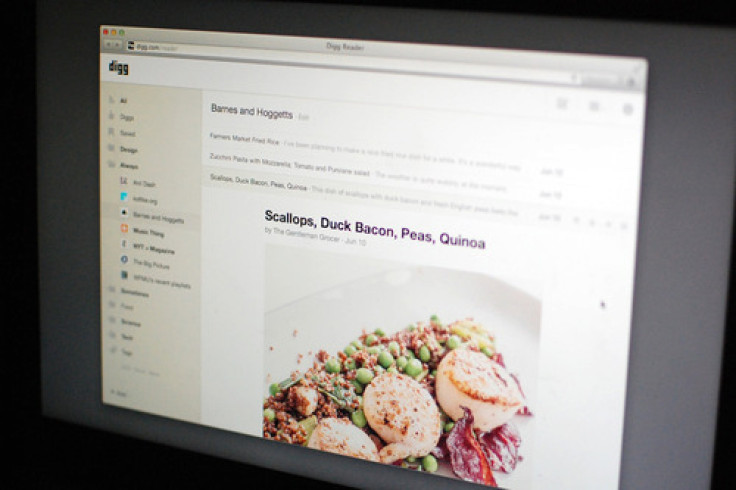Digg's Google Reader Replacement To Launch Next Week

Google announced months ago that it would be pulling the plug on its popular RSS reader Google Reader on July 1, and that deadline is unfortunately almost upon us. Hoping to fill the vacuum left by Reader’s demise, Digg announced Monday that its new Digg Reader will launch in beta next week.
Looking at preview shots of Digg Reader, it seems to be fairly similar in design to the doomed Google Reader. After all, why fix what isn’t broken? Like Google Reader, Digg Reader features a minimalist design based on a sidebar for quickly navigating different RSS feeds and posts.
Digg heavily relied on user feedback for the creation of Digg Reader. More than 18,000 people provided comment on the development process, leading to three main goals for Digg Reader: speed, simplicity, and the ability to import from Google Reader. Digg says it will keep all of these features in mind while focusing on additional features that will benefit Google Reader's old "power users."
“Given the compressed time frame for this sprint, we decided early on that we needed to focus on one type of user,” Digg said in its announcement. “We asked ourselves who had most to lose from the shutdown of Google Reader, and the answer was fairly obvious: the power user, the people who depend on the availability, stability and speed of Reader every day. The good news is that these users are also the most eager to contribute to the development process.”
Digg Reader is set to go live early next week and roll out to all users by June 26. At launch time, Digg Reader will be available on browsers as well as on iOS devices. After Digg Reader goes live on June 26, Digg’s developers plan to start work on several new features, including an Android app, third-party integration, notifications and an improved search feature.
Eventually, Digg Reader will become a “freemium” product, where users can pay extra for increased services, though it’s not clear what extras Digg will offer paid subscribers. Digg says all of the features introduced in the weeks following launch will always be available for free users.
If you’re unsure about Digg’s upcoming RSS reader, there are a few other viable Google Reader alternatives out there as well. One of the most popular is Feedly, a customizable RSS reader available as an app on iOS and Android, as well as an extension for Firefox, Chrome and Safari. Most importantly, though, users can directly import their Google Reader folders for easy use.
Another popular alternative is Flipboard, which offers a much more immersive experience for users by transforming Web content into custom, interactive “magazines” for various topics. Users arrange content from various sources into different digital magazines, and share those magazines with friends and other users. Flipboard is available on iOS, Android, Kindle Fire and Nook.
© Copyright IBTimes 2024. All rights reserved.











